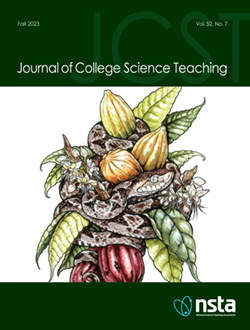Journal of College Science Teaching—Fall 2023

Fall 2023
Volume 52, Number 7
Journal Article
What’s New in NSTA Journals for 2023 and 2024?
Beginning in January 2024, NSTA’s journals will be hosted on the T&F Online platform (https://www.tandfonline.com). NSTA’s journals will be an...
By Peter Lindeman
Journal Article
Undergraduate STEM students may be overwhelmed by the complex information they are exposed to during their education. Even so, there are a handful of ...
By Nora Demers
Journal Article
Academic food security aims to provide students with sufficient access to knowledge (one key academic nutrient) in order to limit intellectual hunger....
By Thomas M. Onorato, Nathalie Oulhen, Gerardo Reyes, Stephany Foster, Cosmo A. Pieplow, Janet E. Rollins, Jacqueline A. Brashears, Claudette Davis, Ian Alberts, Ingrid D. Veras, and Gary M. Wessel
Journal Article
Undergraduate Summer Research Program in the Midst of a Pandemic
Although many summer undergraduate research programs made the decision to delay, cancel, or suspend their summer experiences in response to the corona...
By Ethell Vereen, Munichia McCalla, Joshua Fullerton, and Cynthia Trawick
Journal Article
Although argumentation is a critical historical component of scientific literacy, the recent coronavirus pandemic and associated issues have highlight...
By David C. Owens, Noah P. Sheridan, and Amanda L. Townley
Journal Article
Using a Socioscientific Issues Approach in an Undergraduate Environmental Science Course
A perennial goal of science educators is to develop functional scientific literacy in their students, especially those who will not become professiona...
By Mark H. Newton
Journal Article
Development and Implementation of an Undergraduate STEM Peer Coaching Program
Undergraduate science, technology, engineering, and mathematics (STEM) experiences have academic, psychological, and social challenges that require ad...
By Laura E. Swann, Jonathan L. Hall, Katie Vaccaro-Garska, Samantha R. Seals, and Pamela P. Benz
Journal Article
Existing processes for academic peer review can yield unnecessarily harsh critiques that focus on any vulnerability rather than constructive feedback ...
By Lekelia D. Jenkins
Journal Article
The COVID-19 pandemic led to a series of emergency transitions to online learning for academic institutions around the world. Previous studies have sh...
By Kathleen Hefferon and Esther Angert
Journal Article
Student Self-Care in the Sciences
Instructor support is associated with various positive outcomes for students. Self-care (taking care of one’s physical, mental, and emotional health...
By Carly Yadon
Journal Article
Emphasis on Quality in iNaturalist Plant Collections Enhances Learning and Research Utility
Following the switch to remote online teaching in the wake of the COVID-19 pandemic, the plant taxonomy course at the University of Georgia (UGA) swit...
By Mason C. McNair, Chelsea M. Sexton, and Mark Zenoble
Journal Article
Examining Self-Efficacy, Science Identity, and Sense of Belonging Within a Cohort-Based STEM Program
Since 2010, the National Science Foundation (NSF)–funded Science, Technology, and Math Preparation Scholarships (STAMPS) project has provided financ...
By Ayesha S. Boyce, Cherie Avent, Adeyemo Adetogun, Christopher Hall, Lynn Sametz, P. Lee Phillips, Amelia Kane, Jeffrey Patton, Kimberly Petersen, and Malcolm Schug
Journal Article
Guided by self-determination theory to design an authentic learning environment, we attempted repeated engagement in critical evaluation of evidence t...
By Guang Jin, Alicia Wodika, Rebekka Darner, and Jianwei Lai
Journal Article
More than 8 out of every 10 college students are not STEM majors, yet we have little understanding about learning expectations for them. We used the r...
By Austin Heil, Cara Gormally, and Peggy Brickman
Journal Article
Using Fiction and Nonfiction Readings in Climate Change Education
Facts about climate change are often ineffective in impacting people’s climate change beliefs or environmentally related behaviors. Multiple theorie...
By Alison Singer, Caitlin Kirby, and Eleanor Rappolee
Journal Article
Quantitative reasoning, although included in most science courses, can be challenging to teach. In this article, we explore whether cooperative learni...
By Man-Yin Tsang, Lisa Tutty, and Carl-Georg Bank
Journal Article
Online laboratories can be an effective way to introduce students to lab concepts while providing flexibility, increased access, and reduced costs. Ho...
By Colin Harrison, Clarke Britton, Hannah Shin, and Yassin Watson
Journal Article
Assessing Student Success in a Peer Assisted Learning Program Using Propensity Score Matching
The Peer Assisted Learning (PAL) program at Sacramento State was established in 2012 with one section supporting introductory chemistry. The program n...
By Corey Shanbrom, Michelle Norris, Caitlin Esgana, Matthew Krauel, Vincent Pigno, and Jennifer Lundmark
Journal Article
Teaching Preservice Teachers the Water Cycle With a Conceptual Change Model
The purposes of this study were to examine preservice elementary teachers’ conception of the water cycle; determine if participating in a conceptual...
By Patricia Morrell and Adele Schepige
Journal Article
Comparing Undergraduate Nature of Science Views in Traditional Versus Inquiry-Taught Science Courses
This qualitative study compares the views about nature of science (NOS) between students enrolled in a traditional lecture and laboratory course and s...
By Alex T. St. Louis and Hayat Hokayem

